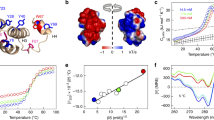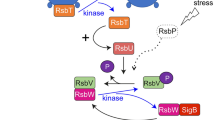Abstract
Cells subjected to a heat shock, or a variety of other stresses,increase the synthesis of a set of proteins, known as heat shockproteins1–3. This response is apparently universal, occurring in the entire range from bacterial to mammalian cells. In Escherichia coli heat shock protein synthesis transiently increases following a shift from 30 °C to 42 °C as a result of changes in transcription initiation at heat shock promoters4–6. Heat shock promoters are recognized by RNA polymerase containing a sigma factor of relative molecular mass (Mr) 32,000 (32K) Eσ32 (refs 7, 8) and not Eσ70, the major form of RNA polymerase holoenzyme6. To determine whether changes in the concentration of σ32 regulate this response, we measured the amount of σ32 before and after shift to high temperature and found that it increased transiently during heat shock as a result of changes in σ32 synthesis and stability. Our results indicate that σ32 is directly responsible for regulation of the heat shock response.
This is a preview of subscription content, access via your institution
Access options
Subscribe to this journal
Receive 51 print issues and online access
$199.00 per year
only $3.90 per issue
Buy this article
- Purchase on Springer Link
- Instant access to full article PDF
Prices may be subject to local taxes which are calculated during checkout
Similar content being viewed by others
References
Schlesinger, M. J., Ashburner, M. & Tissieres, A. in Heat Shock from Bacteria to Man (Cold Spring Harbor Laboratory, New York, 1982).
Craig, E. A. in CRC crit. Rev. Biochem. 18, 239–280 (1985).
Neidhardt, F. C., VanBogelen, R. A. & Vaughn, V. A. Rev. Genet. 18, 295–329 (1984).
Yamamori, T. & Yura, T. J. Bact. 142, 843–851 (1980).
Taylor, W. E. et al. Cell 38, 371–381 (1984).
Cowing, D. W. et al. Proc. natn. Acad. Sci. U.S.A 80, 2679–2683 (1985).
Grossman, A. D., Erickson, J. W. & Gross, C. A. Cell 38, 383–390 (1984).
Bloom, M. et al. J. Bact. 166, 380–384 (1986).
Engback, F., Gross, C. & Burgess, R. R. Molec. gen. Genet. 143, 291–295 (1976).
Lesley, S., Thompson, N. & Burgess, R. J. biol. Chem. 262, 5404–5407 (1987).
Shimke, R. Adv. Enzymol. 37, 135–187 (1973).
Erickson, J. W., Vaughn, V., Walter, W., Neidhardt, F. C. & Gross, C. A. Genes Dev. 1, 419–432 (1987).
Grossman, A. D., Straus, D. B., Walter, W. A. & Gross, C. A. Genes Dev. 1, 179–184 (1987).
Tilly, K., Erickson, J., Sharma, S. & Georgopoulos, C. J. Bact. 168, 1155–1158 (1986).
Cole, J. R. & Nomura, M. J. molec. Biol. 188, 383–392 (1986).
Drahos, D. J. & Hendrix, R. W. J. Bact. 149, 1050–1063 (1982).
Kochan, J. & Murialdo, H. J. Bact. 149, 1166–1170 (1982).
Bahl, H. et al. Genes Dev. 1, 57–64 (1987).
Munro, S. & Pelham, H. Nature 317, 477–478 (1985).
Goff, S. A. & Goldberg, A. L. Cell 41, 587–595 (1985).
Ananthan, J., Goldberg, A. & Voellmy, R. Science 232, 522–524 (1986).
Grossman, A. D. et al. J. Bact. 161, 939–943 (1985).
Laemmli, U. K. Nature 227, 680–685 (1970).
Burnette, W. N. Analyt. Biochem. 112, 195–203 (1981).
Johnson, D. A., Gautsch, J. W., Sportsman, J. R. & Elder, J. M. Gene Analyt. Technol. 1, 3–8 (1984).
Blake, M. S., Johnston, K. M., Russel-Jones, G. J. & Gotschlich, E. C. Analyt. Biochem. 136, 175–179 (1984).
Tjian, R., Stinchcomb, D. & Losik, R. J. biol. Chem. 250, 8824–8828 (1974).
Kessler, S. W. Meth. Enzym. 73, 31 (1981).
Paek, K. H. & Walker, G. C. J. Bact. 165, 763–770 (1986).
Simons, R. W., Houman, F. & Kleckner, N. Gene 53, 85–96 (1987).
Shapira, S. K., Chou, J., Richaud, F. V. & Casadaban, M. J. Gene 25, 71–82 (1983).
Author information
Authors and Affiliations
Rights and permissions
About this article
Cite this article
Straus, D., Walter, W. & Gross, C. The heat shock response of E. coli is regulated by changes in the concentration of σ32. Nature 329, 348–351 (1987). https://doi.org/10.1038/329348a0
Received:
Accepted:
Issue Date:
DOI: https://doi.org/10.1038/329348a0
This article is cited by
-
A three-colour stress biosensor reveals multimodal response in single cells and spatiotemporal dynamics of biofilms
npj Biofilms and Microbiomes (2023)
-
Engineering sigma factors and chaperones for enhanced heterologous lipoxygenase production in Escherichia coli
Biotechnology for Biofuels and Bioproducts (2022)
-
Analysis of temporal gene regulation of Listeria monocytogenes revealed distinct regulatory response modes after exposure to high pressure processing
BMC Genomics (2021)
-
Mechanist idealisation in systems biology
Synthese (2021)
-
Distinct metabolic states of a cell guide alternate fates of mutational buffering through altered proteostasis
Nature Communications (2020)
Comments
By submitting a comment you agree to abide by our Terms and Community Guidelines. If you find something abusive or that does not comply with our terms or guidelines please flag it as inappropriate.



